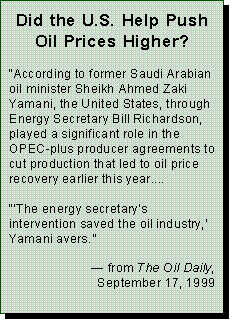 |
||||||||||||||||||||||||
|
||||||||||||||||||||||||
 |
||||||
|
||||||
 |
||||||||||||||||||
|
||||||||||||||||||
 |
|||||||||
|
 |
||||||||||||||||||||||||
|
||||||||||||||||||||||||
 |
||||||||||||||||||||||||
|
||||||||||||||||||||||||
|
What The Media Tell
Americans About Free Enterprise 
As Oil Prices Rise, Free Market Ideas Are Left Out in the Cold For a while this week, the nightly news could have been "That Ď70s Show," as consumers griped about skyrocketing oil and gasoline prices, and TV journalists wondered what the Democrat in the White House would do to fix the situation. Itís not 1979, of course. For one thing, oil prices finally were completely de-regulated in January 1981, shortly after President Ronald Reagan took office. That means that even if it wanted to, the federal government couldnít tell oil companies how much they can charge, although there are a variety of indirect ways the government can influence oil and gas prices. And measured in constant dollars, crude oil prices are only about half as high as they were at their peak twenty years ago, which makes the current spike in prices more of an inconvenience than a full-blown crisis.
On February 15, NBCís Mike Jensen told Nightly News viewers that "gasoline prices that averaged 90 cents a gallon a year ago [are] today $1.36, the highest in almost 10 years. Some experts predicting an additional twenty-cent increase by summer, if crude oil prices donít come down.... All this a potential threat to the economy. Higher oil prices could set off a wave of inflation, President Clinton concerned." After showing a clip of President Clinton promising action ("Thereís going to be some important meetings with the oil-producing countries in the next few days"), Jensen showed "angry motorists" and "consumer advocate" Wenonah Hauter, who asserted that "the real winners are the big oil companies and the people selling oil and gas products." Hauter works for Public Citizen, a Naderite group that was not identified as liberal by Jensen. The next night, "politicians were scrambling to respond to cries from the Northeast, where higher prices and lower temperatures have tripled bills for people like Helen and Albert Masciocchi," according to CBSís Jeffrey Kofman on the Evening News. According to Mr. Masciocchi, because of the higher prices, the elderly couple had been forced to choose between cutting back on their food, prescription drugs, or their home heating oil. "Energy Secretary Bill Richardson admitted that everyone was caught off guard," Kofman continued before quoting Richardson at a meeting with angry Boston consumers. "I think states were unprepared, the government was unprepared, the industry was unprepared," Richardson said. "Everybody was unprepared." Unmentioned by any network was the fact that Richardson had welcomed OPECís decision to slash production last spring, a move which led to depleted inventories and higher prices this winter. "We feel that lower oil prices are good for consumers, but we recognize they can have a negative impact domestically and on some of our friends like Venezuela and Mexico," Energy Secretary Bill Richardson told the New York Times last March. "So far, OPEC's response has been responsible and restrained." In September, according to The Oil Daily, an industry newsletter, former Saudi Arabian Oil Minister Sheikh Ahmed Zaki Yamani told a Houston conference that Richardson had actually encouraged the price hike by persuading the Saudis to cut their production by 600,000 barrels per day. However, an Energy Department spokesperson told The Oil Daily that "Secretary Richardson believes that market forces should dictate oil prices." In an election year, thereís never a shortage of politicians eager to use consumersí misfortune to score a public relations point -- and from the journalistís perspective itís easier to interview a government official than it is to explain the laws of supply and demand. But the mediaís tendency to put the onus on government officials during exceptional economic times undermines the notion that free markets, not further government intervention, offer the best assurance of long-term stability and prosperity. One action that government could take that would help consumers would be to lower or eliminate excise taxes on gasoline, which keeps prices artificially high. According to Americans for Tax Reform, federal and state excise taxes amount to an average of 37.7 cents per gallon of gas, or about a fourth of the total price. Connecticut Governor John Rowland, in fact, is urging a seven-cent cut in his stateís notoriously high gas taxes. But if you watched the evening news this week, the most-talked about idea was for the federal government to sell off a portion of the U.S. strategic petroleum reserve. Amid all of the alarmism at the networks, ABCís Bob Jamieson uniquely reminded viewers of Wednesdayís World News Tonight that, "the politicians may have forgotten that the oil [that forms the nationís strategic reserves] is stored in salt domes along the Gulf Coast. It must first be pumped out, then shipped to refineries, and there processed into heating oil, something that couldnít happen before the end of the winter."
Home | News Division
| Bozell Columns | CyberAlerts |
||||




 But
even if the facts were different, many of the stories could have
been identical, as network reporters interviewed disgruntled
customers and flocked to regulators and other government officials
to deal with the situation.
But
even if the facts were different, many of the stories could have
been identical, as network reporters interviewed disgruntled
customers and flocked to regulators and other government officials
to deal with the situation.